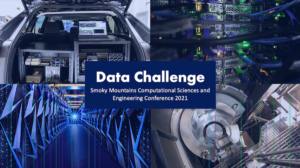
ORNL Invites Student Scientists, Experts to Enter Smoky Mountains Data Challenge
May 13, 2021 — The Department of Energy’s Oak Ridge National Laboratory is now seeking researchers of all career stages to register for the fifth annual Data Challenge, part of the Smoky Mountains Computational Sciences and Engineering Conference, or SMC2021, by June 25.
Each entrant will have access to real scientific datasets drawn from ORNL simulations and facilities used to conduct research in physical science, electron microscopy and many other scientific domains. Teams of up to six participants can choose to tackle one or more of the event’s eight different research challenges and will be divided into multiple categories to compete against others with a similar level of expertise.
 Six of the challenges will test teams on traditional data analytics techniques, but the remaining two will focus on edge computing. This burgeoning field involves storing and analyzing raw data as close as possible to the instrument that produced it, replacing the need to wait for results from distant data centers through the cloud.
Six of the challenges will test teams on traditional data analytics techniques, but the remaining two will focus on edge computing. This burgeoning field involves storing and analyzing raw data as close as possible to the instrument that produced it, replacing the need to wait for results from distant data centers through the cloud.
For each challenge, a team of data sponsors and liaisons will provide a downloadable dataset along with increasingly difficult tasks and questions that range from simple brainteasers to open-ended issues under discussion in the broader research community.
To kick off the competition, the organizing committee will host a webinar in the third week of May, during which representatives from each challenge will describe their expectations and answer questions from participants. The webinar will be recorded and posted on the Data Challenge website, which will also provide other relevant updates in the coming months.
Teams can submit full or partial solutions to these research problems if team members demonstrate their progress and prove that they have gained a better understanding of the tasks and topic at hand. All of this year’s challenges and associated datasets are brand-new.
Data sponsors will judge the real-world viability of the proposed solutions and name three to four winners for each challenge. Selected teams will have the opportunity to write and submit a research paper detailing the methods and resources used to reach high-quality results. After going through the peer review process with the SMC2021 program committee, accepted papers will be published in the Springer conference proceedings. Visit the website for paper submission details and other important deadlines.
Additionally, the winners will be invited to attend and present a poster at SMC2021, which will take place from August 24 to 26 at the MeadowView Conference Resort and Convention Center in Kingsport, Tennessee. These presentations will consist of three-minute lightning talks with two minutes for questions from data sponsors and other attendees.
Last year, 52 teams from numerous universities and other institutions participated in the Data Challenge, breaking the previous participation record by a significant margin. The 16 selected finalists presented posters and earned additional accolades such as “Best Lightning Talk” and “Most Promising Approach.”
This year’s challenge options are as follows:
- Challenge 1: Unraveling Hidden Order and Dynamics in a Heterogeneous Ferroelectric System Using Machine Learning.
- Challenge 2: Finding Novel Links in COVID-19 Knowledge Graph.
- Challenge 3: Synthetic-to-Real Domain Adaptation for Autonomous Driving.
- Challenge 4: Analyzing Resource Utilization and User Behavior on Titan Supercomputer.
- Challenge 5: Sustainable Cities: Socioeconomics, Building Types, and Urban Morphology.
- Challenge 6: Where to go in the Atomic World.
- Challenge 7: Increased Image Spatial Resolution for Neutron Radiography.
- Challenge 8: High Dimensional Active Learning for Microscopy of Nanoscale Materials.
UT-Battelle manages Oak Ridge National Laboratory for DOE’s Office of Science, the single largest supporter of basic research in the physical sciences in the United States. DOE’s Office of Science is working to address some of the most pressing challenges of our time. For more information, visit https://energy.gov/science.
Source: Elizabeth Rosenthal, ORNL































